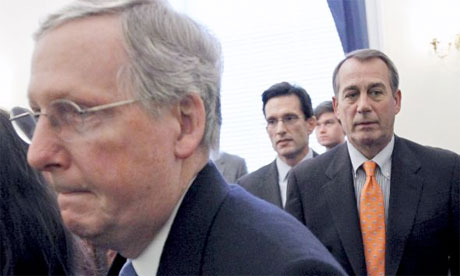G
Guns Guns Guns
Guest

Why has job creation in America slowed to a crawl?
Why, after several months of economic hope, are things suddenly turning sour?
Republicans are so intent on defeating President Obama that they are purposely sabotaging the country's economic recovery.
The most obvious piece of evidence of GOP premeditated malice is the 2010 quote from Senate minority leader, Mitch McConnell:
"The single most important thing we want to achieve is for President Obama to be a one-term president."
Such words lead some to the conclusion that Republicans will do anything, including short-circuiting the economy, in order to hurt Obama politically.
Considering that presidents – and rarely opposition parties – are held electorally responsible for economic calamity, it's not a bad political strategy.
Beyond McConnell's words, though, there is circumstantial evidence to make the case.
Republicans have opposed a lion's share of stimulus measures that once they supported, such as a payroll tax break, which they grudgingly embraced earlier this year.
Even unemployment insurance, a relatively uncontroversial tool for helping those in an economic downturn, has been consistently held up by Republicans or used as a bargaining chip for more tax cuts.
Ten years ago, prominent conservatives were loudly making the case for fiscal stimulus to get the economy going; today, they treat such ideas like they're the plague.
http://www.guardian.co.uk/commentisfree/2012/jun/09/did-republicans-deliberately-crash-us-economy
